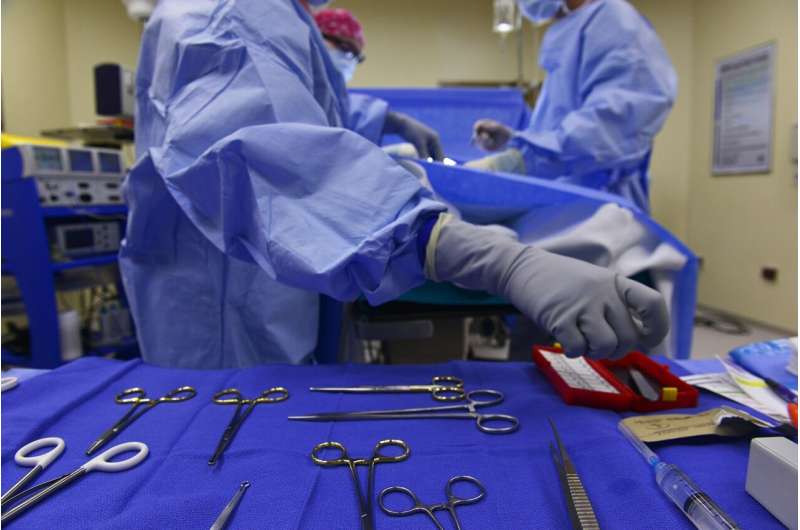High-risk patients benefit from undergoing surgery at teaching hospitals

Patients with a high risk of dying after surgery, including those with multiple chronic diseases, benefit from undergoing general or vascular procedures at a major teaching hospital as opposed to a non-teaching hospital, according to a study from researchers at Penn Medicine and the Children's Hospital of Philadelphia (CHOP).
To better quantify the value of receiving care at teaching hospitals, researchers compared 30-day postoperative outcomes and the costs of surgical procedures—spanning general, vascular and orthopedic surgery—at teaching and non-teaching hospitals. Teaching hospitals, which used more healthcare resources, posted superior outcomes, including higher 30-day mortality rates, for high risk patients who underwent general or vascular surgery. Orthopedic surgery patients experienced similar outcomes at major teaching hospitals and non-teaching hospitals. The findings were published today in Annals of Surgery.
"Academic medical centers are often recognized for their ability to deliver advanced clinical and surgical care, but there has been limited data on which specific patient groups benefit the most—when factoring costs and outcomes—from receiving care at the hospitals,' said the study's senior author Lee A. Fleisher, MD, chair of Anesthesiology and Critical Care and the Robert Dunning Dripps Professor of Anesthesiology and Critical Care at Penn. "Our study showed that as the severity of a patient's medical condition worsened and the complexity of the surgery increased, the benefit of undergoing general or vascular surgery at a teaching hospital also increased."
Teaching hospitals, or academic medical centers, are affiliated with medical schools and train the next generation of physicians. Although prior research has documented outcomes at teaching hospitals, the benefit to patients—when factoring cost and quality—is not well known. For this study, researchers analyzed data from more than 350,000 Medicare beneficiaries who underwent general, vascular or orthopedic surgery at 2,780 hospitals across the country, including 340 major teaching hospitals (defined as having a resident-to-bed ratio of greater than .25). The study looked costs and patient outcomes—including 30-day mortality rates—for dozens of procedures, such as mastectomy, appendectomy, gastric bypass, blood vessel repair and total knee replacement. When calculating the total costs, the team included costs for resources used within 30 days of patient admission, including office visits and readmissions. Researchers matched pairs of individuals based on the procedure, risk profile and factors related to their medical history, including comorbidities such as diabetes and high blood pressure.
Among general surgery patients with the highest risk score, the 30-day mortality rate was 15.9 percent at major teaching hospitals and 18.2 percent at non-teaching hospitals. The mortality rate of high-risk vascular surgery patients was nearly one percent lower at teaching hospitals compared to non-teaching hospitals (15.5 percent and 16.4 percent, respectively). The mortality rate for orthopedic surgery procedures was significantly lower across the board than the rates for vascular and general surgery.
In order to calculate the value—or the cost for a one percent reduction in mortality rates—the team divided the differences in resource-utilization costs at major teaching and non-teaching hospitals by the difference in 30-day mortality rates. The overall value for general surgery was $965 for a one percent reduction in mortality, while the estimate for vascular surgery was $3,567.
"Academic medical centers—which often receive referrals for complicated patient cases—have extensive experience in treating very sick patients, including those with complex medical conditions," Fleisher said. Our study provides new data that can help inform patient decisions and influence hospital referral patterns, ultimately moving us closer to a system that ensures patients have access to the treatment they need."


















